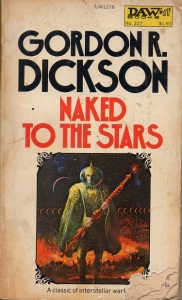Book Review: Naked to the Stars by Gordon R. Dickson
Section Leader Calvin Truant of the 91st Combat Engineers has not slept in two days, his unit is at less than half strength and their translator is dying, and all the officers have been killed, leaving Cal in command. The truce with the alien Lehaunan is about to end, and it looks like the village they’re stationed near has been getting reinforcements all night. So it’s understandable that Cal orders an attack as of the official end of the truce.
The 91st takes the village, only to discover it undefended beyond a few mine guards. Cal abruptly wakes up in an ambulance ship sixteen hours later, with wounds he doesn’t remember getting. The physical injuries are healed with future medical technology, but the missing hours are still a blank. The brass won’t let him re-enlist for a combat role unless he undergoes a psychiatric probe, but Cal fears that they might find something that would bar him from service forever, and being a soldier is all he knows.
A recruiter offers a way past this impasse. While Cal is barred from combat, he could become a Contacts Officer, a non-combatant medic/translator/diplomat embedded with the troops to win alien hearts and minds as the humans conquer them. It’s not an admired profession, but someone’s got to do it, and it’s a way to get back in uniform. Cal reluctantly agrees, and completes the training just in time to be assigned to the war against the Paumons. There, he may be able to confront his daddy issues and the horror that lies within the missing hours.
Gordon R. Dickson was best known for his Dorsai novels, military science fiction about futuristic mercenaries. This book takes a different tack, as Cal must confront the fact that winning a war isn’t just about conquering the enemy militarily.
It’s interesting to compare this book to Starship Troopers by Robert Heinlein, also published in 1961. Both feature societies where politics is dominated by military veterans, with public flogging, and extensive sections set in boot camp. But where the Heinlein book had the troopers protecting a largely apathetic citizenry from aggressive aliens who sought only to destroy, in this book, the government suppresses dissent by violence, and is engaged in expansionist colonization with preemptive attacks on technologically inferior aliens on flimsy pretexts. The books are also almost polar opposites on pacifism, with one discarding it as useless passivism, while the other sees it as a better way forward.
As mentioned above, Cal has issues due to his difficult relationship with his father, who he chose to blame for the death of his mother. He also has what we’d consider untreated post-traumatic stress that causes him to detach himself from those around him. This being the kind of novel it is, most of this gets resolved by Cal having epiphanies, rather than therapy. It also makes him rather unsympathetic in the middle section.
Cal’s relationship with nurse Annie Warroad is somewhat disjointed; much of its development is off-stage, but at least it’s clear that it does develop (as opposed to the usual 50s/60s SF thing of “love happens because the hero gets the girl.”) The difficulties in the relationship realistically come from Cal’s emotional issues and tendency to push people away.
This is not considered one of Mr. Dickson’s stronger works, in part I think because it has an agenda that plays against the grain of the subgenre. And given that the Earth is more or less the bad guys in this one, it may not sit well with some more jingoistic readers. But it’s got some interesting ideas, and is probably available in a used book store near you, or even your library.

